#assembly election in 5 states
Explore tagged Tumblr posts
Text
Election Commission of India Declares 2023 Assembly Polls in 5 States; Parties Express Readiness
The Election Commission of India (ECI) has officially unveiled the election schedule for assembly polls in five Indian states, namely Madhya Pradesh, Chhattisgarh, Rajasthan, Telangana, and Mizoram in 2023. Voting starts on Nov 7, counting on Dec 3. The announcement, made earlier today, provided crucial details regarding the electoral process, including nomination filing deadlines, polling…

View On WordPress
0 notes
Text
BJP woke up earlier..! Exercise on five state elections..!!
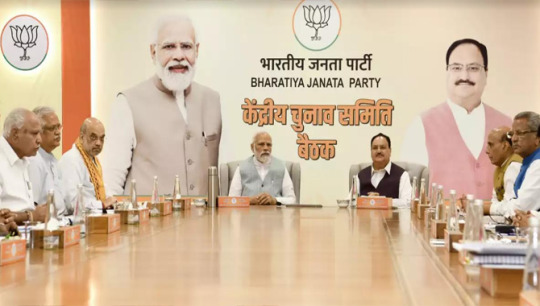
Bharatiya Janata Party woke up earlier this time. Generally, after receiving the notification of election for any state, the election committee of that party meets and takes decisions. But this time it did not happen. Sharpening strategies regardless of notification. The BJP election committee is reviewing the five state assembly elections to be held later this year. It is interesting to review the elections three months earlier than ever before. Doubts are arising whether it is fear of losing…precaution…
Assembly elections will be held in the states of Madhya Pradesh, Rajasthan, Chhattisgarh, Telangana and Mizoram at the end of this year. Rest of Mizoram are key states. Currently BJP is in power only in Madhya Pradesh. In Mizoram it shared power with the Mizo National Front. However, in the background of the developments in Manipur, the relations between the Mizoram National Front and the BJP are at an end. BJP is determined to win all five of these elections. That is why election strategies are being sharpened three months in advance.
#Article#BJP Meeting#5 States#Elections#BJP#Bharatiya Janata Party#Assembly elections#Madhya Pradesh#Rajasthan#Chhattisgarh#Telangana#Mizoram#Latest News#Telugu News#Trending News#Telugu Times News
0 notes
Video
youtube
How Trump is Following Hitler's Playbook
You’ve heard Trump’s promise:
TRUMP: I’m going to be a dictator for one day.
History shows there are no “one-day” dictatorships. When democracies fall, they typically fall completely.
In a previous video, I laid out the defining traits of fascism and how MAGA Republicans embody them. But how could Trump — or someone like him — actually turn America into a fascist state? Here’s how in five steps.
Step 1: Use threats of violence to gain power
Hitler and Mussolini relied on their vigilante militias to intimidate voters and local officials. We watched Trump try to do the same in 2020.
TRUMP: Proud Boys, stand back and stand by.
Republican election officials testified to the threats they faced when they refused Trump’s demands to falsify the election results.
RAFFENSPERGER: My email, my cell phone was doxxed.
RUSTY BOWERS: They have had video panel trucks with videos of me proclaiming me to be a pedophile.
GABRIEL STERLING: A 20-something tech in Gwinnett County today has death threats and a noose put out saying he should be hung for treason.
If the next election is close, threats to voters and election officials could be enough to sabotage it.
Step 2: Consolidate power
After taking office, a would-be fascist must turn every arm of government into a tool of the party. One of Hitler’s first steps was to take over the civil service, purging it of non-Nazis.
In October of 2020, Trump issued his own executive order that would have enabled him to fire tens of thousands of civil servants and replace them with MAGA loyalists. He never got to act on it, but he’s now promising to apply it to the entire civil service.
That’s become the centerpiece of something called Project 2025, a presidential agenda assembled by MAGA Republicans, that would, as the AP put it, “dismantle the US government and replace it with Trump’s vision.”
Step 3: Establish a police state
Hitler used the imaginary threat of “the poison of foreign races” to justify taking control of the military and police, placing both under his top general, and granting law-enforcement powers to his civilian militias.
Now Trump is using the same language to claim he needs similar powers to deal with immigrants.
Trump plans to deploy troops within the U.S. to conduct immigration raids and round up what he estimates to be 18 million people who would be placed in mass-detention camps while their fate is decided.
And even though crime is actually down across the nation, Trump is citing an imaginary crime wave to justify sending troops into blue cities and states against the will of governors and mayors.
Trump insiders say he plans to invoke the Insurrection Act to have the military crush civilian protests. We saw a glimpse of that in 2020, when Trump deployed the National Guard against peaceful protesters outside the White House.
And with promises to pardon January 6 criminals and stop prosecutions of right-wing domestic terrorists, Trump would empower groups like the Proud Boys to act as MAGA enforcers.
Step 4: Jail the opposition
In classic dictatorial fashion, Trump is now openly threatening to prosecute his opponents.
TRUMP: if I happen to be president and I see somebody who’s doing well and beating me very badly, I say, ‘Go down and indict them.’ They’d be out of business.
And he’s looking to remake the Justice Department into a tool for his personal vendettas.
TRUMP: As we completely overhaul the federal Department of Justice and FBI, we will also launch sweeping civil rights investigations into Marxist local district attorneys.
In the model of Hitler and Mussolini, Trump describes his opponents as subhuman.
TRUMP: …the radical left thugs that live like vermin within the confines of our country…
Step 5: Undermine the free press
As Hitler well understood, a fascist needs to control the flow of information. Trump has been attacking the press for years.
And he’s threatening to punish news outlets whose coverage he dislikes.
He has helped to reduce trust in the media to such a historic low that his supporters now view him as their most trusted source of information.
Within a democracy, we may often have leaders we don’t like. But we have the power to change them — at the ballot box and through public pressure. Once fascism takes hold, those freedoms are gone and can’t easily be won back.
We must recognize the threat of fascism when it appears, and do everything in our power to stop it.
424 notes
·
View notes
Text
This is a gift article
“In normal times, Americans don’t think much about democracy. Our Constitution, with its guarantees of free press, speech, and assembly, was written more than two centuries ago. Our electoral system has never failed, not during two world wars, not even during the Civil War. Citizenship requires very little of us, only that we show up to vote occasionally. Many of us are so complacent that we don’t bother. We treat democracy like clean water, something that just comes out of the tap, something we exert no effort to procure.
“But these are not normal times.”
I wrote those words in October 2020, at a time when some people feared voting, because they feared contagion. The feeling that “these are not normal times” also came from rumors about what Donald Trump’s campaign might do if he lost that year’s presidential election. Already, stories that Trump would challenge the validity of the results were in circulation. And so it came to pass.
This time, we are living in a much different world. The predictions of what might happen on November 5 and in the days that follow are not based on rumors. On the contrary, we can be absolutely certain that an attempt will be made to steal the 2024 election if Kamala Harris wins. Trump himself has repeatedly refused to acknowledge the results of the 2020 election. He has waffled on and evaded questions about whether he will accept the outcome in 2024. He has hired lawyers to prepare to challenge the results.
Trump also has a lot more help this time around from his own party. Strange things are happening in state legislatures: a West Virginia proposal to “not recognize an illegitimate presidential election” (which could be read as meaning not recognize the results if a Democrat wins); a last-minute push, ultimately unsuccessful, to change the way Nebraska allocates its electoral votes. Equally weird things are happening in state election boards. Georgia’s has passed a rule requiring that all ballots be hand-counted, as well as machine-counted, which, if not overturned, will introduce errors—machines are more accurate—and make the process take much longer. A number of county election boards have in recent elections tried refusing to certify votes, not least because many are now populated with actual election deniers, who believe that frustrating the will of the people is their proper role. Multiple people and groups are also seeking mass purges of the electoral rolls.
Anyone who is closely following these shenanigans—or the proliferation of MAGA lawsuits deliberately designed to make people question the legitimacy of the vote even before it is held—already knows that the challenges will multiply if the presidential vote is as close as polls suggest it could be. The counting process will be drawn out, and we may not know the winner for many days. If the results come down to one or two states, they could experience protests or even riots, threats to election officials, and other attempts to change the results.
This prospect can feel overwhelming: Many people are not just upset about the possibility of a lost or stolen election, but oppressed by a sensation of helplessness. This feeling—I can’t do anything; my actions don’t matter—is precisely the feeling that autocratic movements seek to instill in citizens, as Peter Pomerantsev and I explain in our recent podcast, Autocracy in America. But you can always do something. If you need advice about what that might be, here is an updated citizen’s guide to defending democracy.
Help Out on Voting Day—In Person
First and foremost: Register to vote, and make sure everyone you know has done so too, especially students who have recently changed residence. The website Vote.gov has a list of the rules in all 50 states, in multiple languages, if you or anyone you know has doubts. Deadlines have passed in some states, but not all of them.
After that, vote—in person if you can. Because the MAGA lawyers are preparing to question mail-in and absentee ballots in particular, go to a polling station if at all possible. Vote early if you can, too: Here is a list of early-voting rules for each state.
Secondly, be prepared for intimidation or complications. As my colleague Stephanie McCrummen has written, radicalized evangelical groups are organizing around the election. One group is planning a series of “Kingdom to the Capitol” rallies in swing-state capitals, as well as in Washington, D.C.; participants may well show up near voting booths on Election Day. If you or anyone you know has trouble voting, for any reason, call 866-OUR-VOTE, a hotline set up by Election Protection, a nonpartisan national coalition led by the Lawyers’ Committee for Civil Rights Under Law.
If you have time to do more, then join the effort. The coalition is looking for lawyers, law students, and paralegals to help out if multiple, simultaneous challenges to the election occur at the county level. Even people without legal training are needed to serve as poll monitors, and of course to staff the hotline. In the group’s words, it needs people to help voters with “confusing voting rules, outdated infrastructure, rampant misinformation, and needless obstacles to the ballot box.”
If you live in Arizona, Florida, Georgia, Michigan, Nevada, Ohio, Pennsylvania, or Wisconsin, you can also volunteer to help All Voting Is Local, an organization that has been on the ground in those states since before 2020 and knows the rules, the officials, the potential threats. It, too, is recruiting legal professionals, as well as poll monitors. If you don’t live in one of those states, you can still make a financial contribution.
Wherever you live, consider working at a polling station. All Voting Is Local can advise you if you live in one of its eight states, but you can also call your local board of elections. More information is available at PowerThePolls.org, which will send you to the right place. The site explains that “our democracy depends on ordinary people who make sure every election runs smoothly and everyone's vote is counted—people like you.”
Wherever you live, it’s also possible to work for one of the many get-out-the-vote campaigns. Consider driving people to the voting booth. Find your local group by calling the offices of local politicians, members of Congress, state legislators, and city councillors. The League of Women Voters and the NAACP are just two of many organizations that will be active in the days before the election, and on the day itself. Call them to ask which local groups they recommend. Or, if you are specifically interested in transporting Democrats, you can volunteer for Rideshare2Vote.
If you know someone who needs a ride, then let them know that the ride-hailing company Lyft is once again working with a number of organizations, including the NAACP, the National Council of Negro Women, Iraq and Afghanistan Veterans of America, the National Council on Aging, Asian and Pacific Islander American Vote, and the Hispanic Federation. Contact any of them for advice about your location. Also try local religious congregations, many of whom organize rides to the polls.
Smaller gestures are needed too. If you see a long voting line, or if you find yourself standing in one, report it to Pizza to the Polls and the group will send over some free pizza to cheer everyone up.
Join Something Now
Many people have long been preparing for a challenge to the election and a battle in both the courts and the media. You can help them by subscribing to the newsletters of some of the organizations sponsoring this work, donating money, and sharing their information with others. Don’t wait until the day after the vote to find groups you trust: If a crisis happens, you will not want to be scouring the internet for information.
Among the organizations to watch is the nonpartisan Protect Democracy, which has already launched successful lawsuits to secure voting rights in several states. Another is the States United Democracy Center, which collaborates with police as well as election workers to make sure that elections are safe. Three out of four election officials say that threats to them have increased; in some states, the danger will be just as bad the day after the election as it was the day before, or maybe even worse.
The Brennan Center for Justice, based at NYU, researches and promotes concrete policy proposals to improve democracy, and puts on public events to discuss them. Its lawyers and experts are preparing not only for attempts to steal the election, but also, in the case of a Trump victory, for subsequent assaults on the Constitution or the rule of law.
For voters who lean Democratic, Democracy Docket also offers a wealth of advice, suggestions, and information. The group’s lawyers have been defending elections for many years. For Republicans, Republicans for the Rule of Law is a much smaller group, but one that can help keep people informed.
Talk With People
In case of a real disaster—an inconclusive election or an outbreak of violence—you will need to find a way to talk about it, including a way to speak with friends or relatives who are angry and have different views. In 2020, I published some suggestions from More in Common, a research group that specializes in the analysis of political polarization, for how to talk with people who disagree with you about politics, as well as those who are cynical and apathetic. I am repeating here the group’s three dos and three don’ts:
•Do talk about local issues: Americans are bitterly polarized over national issues, but have much higher levels of trust in their state and local officials. •Do talk about what your state and local leaders are doing to ensure a safe election. •Do emphasize our shared values—the large majority of Americans still feel that democracy is preferable to all other forms of government—and our historical ability to deliver safe and fair elections, even in times of warfare and social strife. •Don’t, by contrast, dismiss people’s concerns about election irregularities out of hand. Trump and his allies have repeatedly raised the specter of widespread voter fraud in favor of Democrats. Despite a lack of evidence for this notion, many people may sincerely believe that this kind of electoral cheating is real. •Don’t rely on statistics to make your case, because people aren’t convinced by them; talk, instead, about what actions are being taken to protect the integrity of the vote. •Finally, don’t inadvertently undermine democracy further: Emphasize the strength of the American people, our ability to stand up to those who assault democracy. Offer people a course of action, not despair.
As a Last Resort, Protest
As in 2020, protest remains a final option. A lot of institutions, including some of those listed above, are preparing to step in if the political system fails. But if they all fail as well, remember that it’s better to protest in a group, and in a coordinated, nonviolent manner. Many of the organizations I have listed will be issuing regular statements right after the election; follow their advice to find out what they are doing. Remember that the point of a protest is to gain supporters—to win others over to your cause—and not to make a bad situation worse. Large, peaceful gatherings will move and convince people more than small, angry ones. Violence makes you enemies, not friends.
Finally, don’t give up: There is always another day. Many of your fellow citizens also want to protect not just the electoral system but the Constitution itself. Start looking for them now, volunteer to help them, and make sure that they, and we, remain a democracy where power changes hands peacefully.
245 notes
·
View notes
Text
We are still in the midst of COVID-19 pandemic. New Yorkers are still being hospitalized with COVID and still dying from COVID. People are still getting Long COVID and other serious health issues from COVID.
Everyone is at risk of Long COVID and other serious health issues from COVID.
Masks are a critical public health tool that help protect people from COVID.
Masks also help protect against other contagious diseases, wildfire smoke, pollution, allergens, and other health concerns.
Everyone has a right to wear a mask.
There should not be a mask ban. A mask ban puts the lives and health of all New Yorkers at risk.
WHAT CAN YOU DO?
This toolkit includes a letter you can send to your reps if you live in, are currently in, and/or travel to New York.
1. Contact Governor Hochul. Urge her not to ban masks.
Phone: 518-474-8390 (press 1 to leave a message, press 2 to speak to a person)
Email: https://governor.ny.gov/content/governor-contact-form
Mail: The Honorable Kathy Hochul Governor of New York State NYS State Capitol Building Albany, NY 12224
Twitter/X: @GovKathyHochul
Instagram and Threads: @GovKathyHochul
2. Contact your NYS Senator and Assemblymember. Urge them to speak out against mask bans and not to support mask ban legislation.
Find your state elected officials and their contact info at: https://www.usa.gov/elected-officials
Check to see if your NYS Senator or Assemblymember has taken a stance on mask bans on our New York Mask Ban Tracker at: http://bit.ly/NYMaskBanTracker
Please let us know if your NYS Senator or Assemblymember speaks out publicly against mask bans.
3. Contact NYS Senate and Assembly leadership. Urge them to speak out against mask bans and not to support mask ban legislation.
NYS Assembly Speaker Carl Heastie
Phone: 518-455-3791
Email: [email protected]
Twitter/X: @CarlHeastie
Instagram and Threads: @CHeastie
NYS Senate Majority Leader Andrea Stewart-Cousins
Phone: (518) 455-2585
Email: [email protected]
Twitter/X: @AndreaSCousins
Instagram and Threads: @AndreaStewartCousins
4. Contact NYS Senate and Assembly Health Committee Chairs. Urge them to speak out against mask bans and not to support mask ban legislation.
NYS Senate Health Committee Chair J. Gustavo Rivera
Phone:Albany Office - 518-455-3395
Email: [email protected]
Twitter/X: @NYSenatorRivera
Instagram: @NYSenatorRivera
NYS Assembly Health Committee Chair Amy Paulin
NOTE: Paulin is a co-sponsor for the mask ban bill A10057A.
Phone:Albany Office - 518-455-5585
Email: [email protected]
Twitter/X: @AmyPaulin
Instagram: @AmyPaulin1
5. Contact your local elected officials, including City Council Members and NYC Borough Presidents. Urge them to speak out against mask bans.
Find your city elected officials and their contact info at: https://www.usa.gov/elected-officials
6. Sign up for an account on the NY Senate webpage and let them know you oppose each of the mask ban bills. There is a question on the right side of the webpage for each bill that asks if you oppose or support the bill. Write that you oppose the bill. In addition, if possible, add a comment expressing opposition to the mask ban bills.
S09867
A10057A
A10043
S09194
7. Contact NYC Mayor Adams.
Email: https://www.nyc.gov/office-of-the-mayor/mayor-contact.page
Phone: 311 or 212-NEW-YORK outside NYC
Twitter: @NYCMayor and @NYCMayorsOffice
Mail: Mayor Eric Adams City Hall New York, NY 10007
Instagram and Threads: @NYCMayor
8. For those not in NY State, you could contact the NY’s Tourism Board and let them know you won’t be traveling to NY State or are canceling your travel plans to NY State due to the proposed mask ban.
Email: [email protected]
Twitter/X: @I_LOVE_NY
Instagram: @ILoveNY
More info: https://www.iloveny.com/
9. Write a letter to the editor or op-ed. See examples below.
10. Post your opposition to a mask ban on social media and share why you still wear a mask. Use the hashtag #NoNYMaskBan.
11. If you are Jewish, sign on to this sign-on letter to state leaders organized by Jews for Mask Rights. This letter is open to all Jewish people affected by this legislation, whether as New Yorkers, commuters, or tourists.
12. Spread the word! Share a link to this toolkit (http://bit.ly/StopMaskBanNY) and graphics below to encourage other people to take action.
13. Wear a mask! Post a photo of yourself wearing a mask on social media.If you hold a public event, require masks at your event and post photos with everyone wearing a mask.
#nyc#long island#new york#jewblr#disability justice#disability wrath month#intersectionality#psa#long post
101 notes
·
View notes
Text
The Best News of Last Week - May 15, 2023
🐕 - Now It's a Paw-ty
1. World's oldest ever dog celebrates 31st birthday

Bobi was born on 11 May 1992, making him 31 years old, in human years. A big birthday party is planned for Bobi today, according to Guinness World Records.
It will take place at his home in the rural Portuguese village of Conqueiros in Leiria, western Portugal, where he has lived his entire life.
2. The FDA has officially changed its policy to allow more gay and bisexual men to donate blood
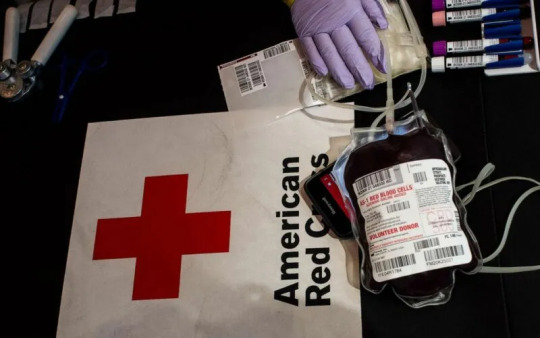
The Food and Drug Administration (FDA) has announced that they’ve eased restrictions on blood donations by men who have sex with men in an effort to address blood shortages. The new policy recommends a series of individual risk-based questions that will apply to all donors, regardless of their sexual orientation, sex, or gender. Gay or bisexual men in monogamous relationships will now be permitted to donate blood.
3. Illinois passes bill to ensure community college credits transfer to public universities

The Illinois General Assembly has passed a bill that would help community college students transfer to public universities.
It would ensure that certain classes taken at community colleges could be transferred to any higher education institution in the state. Some schools currently only count community college coursework as elective credits.
4. Brazilian President Lula recognizes 6 new indigenous territories stretching 620,000 hectares, banning mining and restricting farming within them

Brazilian President Luiz Inácio Lula da Silva has decreed six new indigenous reserves, banning mining and restricting commercial farming there. The lands - including a vast area of Amazon rainforest - cover about 620,000 hectares (1.5m acres).
Indigenous leaders welcomed the move, but said more areas needed protection.
5. More than 1,000 trafficking victims rescued in separate operations in Southeast Asia
More than 1,000 trafficking victims were rescued in separate operations in Southeast Asia over the last week, officials in Indonesia and the Philippines said.
Indonesian officials said Sunday they freed 20 of their nationals who were trafficked to Myanmar as part of a cyber scam, amid an increase in human trafficking cases in Southeast Asia. Fake recruiters had offered the Indonesians high-paying jobs in Thailand but instead trafficked them to Myawaddy, about 567 kilometers (352 miles) south of Naypyidaw, the capital, to perform cyber scams for crypto websites or apps, said Judha Nugraha, an official in Indonesia's Foreign Affairs Ministry.
6. A peanut allergy patch is making headway in trials

An experimental “peanut patch” is showing some promise for toddlers who are highly allergic to peanuts. The patch, called Viaskin, was tested on children ages one to three for a late-stage trial, and the results show that the patch helped children whose bodies could not tolerate even a small piece of peanuts safely eat a few.
After one year, two-thirds of the children who used the patch and one-third of the placebo group met the trial’s primary endpoint. The participants with a less sensitive peanut allergy could safely tolerate the peanut protein equivalent of eating three or four peanuts.
7. Critically endangered lemur born at Calgary Zoo

The Calgary Zoo has released pictures of its newest addition, a baby lemur. The zoo says its four-year-old female black-and-white ruffed lemur, Eny, gave birth on April 7. The pup’s father is eight-year-old Menabe. The gender of the pup has not been confirmed but the Calgary Zoo says the pup appears bright-eyed and active and is on the move.
The black-and-white ruffed lemur is registered among the 25 most endangered primates in the world, due mostly to habitat loss and hunting.
----
That's it for this week :)
This newsletter will always be free. If you liked this post you can support me with a small kofi donation:
Buy me a coffee ❤️
Also don’t forget to reblog.
SUBCRIBE HERE for more good news in your inbox
657 notes
·
View notes
Text
Tommy Thompson

Physique: Average Build Height: 5′ 8″ (1.73 m)
Tommy George Thompson (born November 19, 1941) is an American Republican politician from Juneau County, Wisconsin. He served as the 19th United States secretary of Health and Human Services from 2001 to 2005 in the cabinet of President George W. Bush. Before that, he was the 42nd governor of Wisconsin (1987–2001) and Republican floor leader in the Wisconsin State Assembly (1981–1987). He is the longest-serving governor in Wisconsin history, holding office from January 1987 until February 2001, and is the only person to be elected to the office four times.





Whilst he didn't quite do it for me when he was at the height of his fame. Not that I didn't find him attractive, because I did. Its just that there were a lot politicians back then that was ahead of him. But I could tell that he was going to still be very fuckable when he got older. He dresses nice, has great hair(now gray) and one of the nicest set of lips I have ever seen. Man, I'd love to do things to him that would make him blush.



Born in Elroy, WI, Thompson graduated from the local high school in 1959. In 1963 he received a bachelors degree in political science from the University of Wisconsin. He entered the law school at Wisconsin that same year, completing his J.D. degree in 1966. He plunged into politics in the summer after he finished law school, first elected to public office in 1966 when, at the age of 24, he won election to the State Assembly.





Of course he's married, to Sue Ann Mashak in 1968, and together three children and five grandchildren. Thompson has dedicated his life and career to public service, but now is more or less a farmer working on his family farm in Elroy. So since he's a farmer now, he wouldn't mind taking me around the farm. If you know what I mean.

63 notes
·
View notes
Text
Next week in Venezuela presidential elections will be held, in which the future of the country is at stake, as the current socialist asshole that has completely ruined the country, Nicolas Maduro, has for once a united opposition party going against him, lead by a woman named Maria Corina Machado, herself a former member of the National Assembly, until she was illegally removed from her position, and former presidential candidate, until she was also illegally removed from that, forcing her to nominate her deputy, Edmundo Gonzalez, as the main opposition candidate.

Currently the Venezuelan regime claims the elections will be fair, yet they have engaged in a massive intimidation campaign against supporters of Corina, closing roads for her caravans, many times actually destroying them all together, while fining and even closing down businesses like restaurants and hotels that gave their services to her and her supporters.
But so far those campaigns don’t seem to be working, and instead have galvanized support for her even more, all the while Maduro and his cronies have to literally force state employees to attend his rallies or be fired, and even with that public support has been at best pathetic.
I guess we will see if this will or won’t be a repeat of the fraudulent 2018 elections, in which now disgraced opposition candidate, Juan Guadió, “lost” the election, triggering a worse emigration crisis that continues to this day, with some 5 million Venezuelans already leaving the country as of 2024.
41 notes
·
View notes
Text
A North Carolina appeals court on Friday ruled that Robert F. Kennedy Jr.'s name must be taken off state ballots for president, upending plans in the battleground state just as officials were about to begin mailing out the nation’s first absentee ballots for the Nov. 5 presidential election. The intermediate-level Court of Appeals issued an order granting Kennedy’s request to halt the mailing of ballots that included his name. The court also told a trial judge to order the State Board of Elections to distribute ballots without Kennedy’s name on them. No legal explanation was given. State law otherwise required the first absentee ballots to be mailed or transmitted no later than 60 days before the general election, making Friday the deadline. The process of reprinting and assembling ballot packages likely would take more than two weeks, state attorneys have said. The ruling could be appealed. Kennedy, the nominee of the We The People party in North Carolina, had sued last week to get off the state’s ballots after he suspended his campaign and endorsed Republican nominee Donald Trump. But the Democratic majority on the State Board of Elections rejected the request, saying it was too late in the process of printing ballots and coding tabulation machines. Kennedy then sued.
10 notes
·
View notes
Text
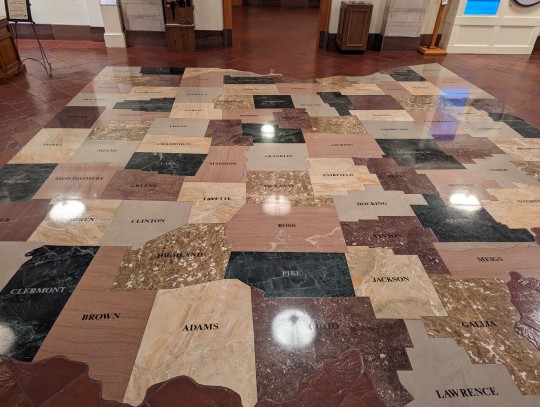
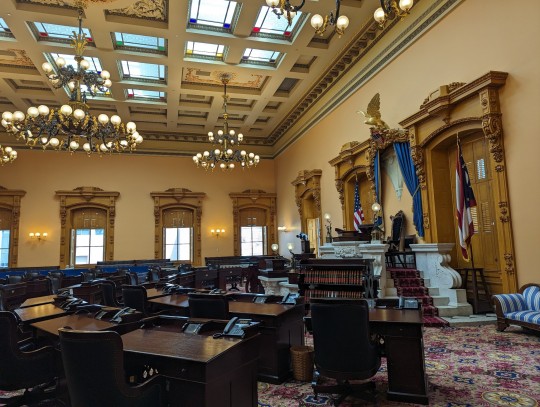





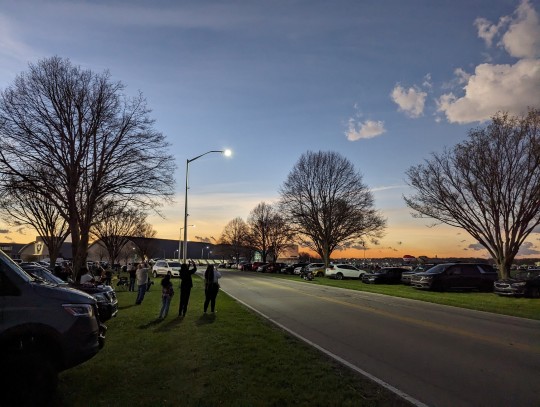


8/5/2024 - 8/8/2024
Time for the latest installment of my "Don't post about a vacation until after I'm back home" series:
We were killing time in a mall before leaving for the airport on Friday when I noticed the overhead lights swaying in a store. Felt like a massive train was rolling by just outside, but I knew we weren't close enough to the NJ Transit line to actually feel it. Turns out it was a ⋆⭒˚.⋆4.8 earthquake⋆⭒˚.⋆.
Our flight got delayed for three hours while the runway was inspected for damage. While waiting to get dinner in the terminal, the lights started swaying again and we felt a 3.8 aftershock six hours after the first.
@perilous-pursuit-of-perfection and @humdrumhootenanny picked us up from the airport and let us stay with them and we didn't take a single group photo the entire weekend, but just trust me.
Next day we went to the Ohio statehouse in Columbus for a free tour. Learned that Ohio bounced around three previous capitals before the state legislature passed a law to create a permanent capital. Also Abraham Lincoln was in this building giving a speech to the state assembly when he received a telegram informing him he'd won the 1860 Presidential Election.
Next day went to the Columbus Art Museum and I was trying to get that picture of Morning Sun by Edward Hopper but this hipster couple stood in front of it chatting for honestly more than 10 minutes so I left and came back later. Also there was a cool exhibit from 2023 about "Final Girls" in horror slasher movies. Slumber Party Martyrs by Robin F. Williams was my favorite.
We also went to a Field of Corn, except the corn was made out of concrete. Andrew climbed and stood on top of one without killing himself and it was very impressive.
Day of the eclipse we left for the National Museum of the US Air Force super early and hit no traffic, and were directed to park surprisingly close to the exit. Got to see literally dozens of planes from pre-WWI up through current models (was not expecting to see an actual F-22 on display). Also the B2 stealth bomber is enormous in person and really does look otherworldly compared to "normal" planes.
The sunlight started getting noticeably dimmer about a quarter to 3 PM, and the rate of dimming felt exponential. Things started getting dark very quickly in the last minute. The museum was having a huge event for the day so there were maybe a few thousand people there with us. I thought that would take away from the experience and be distracting, but it kinda made the whole thing even more thrilling to hear a massive crowd around us cheer and shout when the sun disappeared. Totality honestly looked fake. It looked like a hole was punched in an old CRT computer monitor. The air got noticeably colder and you could see stars in the sky. The entire horizon looked like a sunset in every direction at the same time. Honestly got emotional and lost my breath in a physiological reaction; it felt like I got punched in the gut without the pain. About 2 1/2 minutes later a very bright pinpoint appeared in the bottom right quadrant and the sun started coming back. A few minutes after that, looking to the northeast where the shadow continued it just looked like a massive thunderstorm without any clouds.
Managed to beat the crowd out of the museum parking grounds and hit zero traffic on the 1-hour drive back to Columbus. The eclipse was even still happening when we got back to the house.
Other than the earthquake (which, who the fuck saw that coming), this trip went exactly as I planned for, which is such a relief considering how much I was stressing myself out over the weather in the week beforehand.
21 notes
·
View notes
Text
Ready for the pain
youtube
Another day, another meeting. Faloi Frosilaen, young president of the newly formed Paper Republic, has very strictly tied days. Waking up at 5 AM, working, discussing with parlementaries, dealing with revolts, with the gigantic administration, meeting with his ministers, sometimes giving a speech to the Inkan people, thousands of them. Most of the time, he wouldn't be in bed until midnight.
It's a pretty reasonable rythm, in his opinion. It's only been one year since he took office, and all his work and dedication have been put to the organization of public elections.
A first in what was the longest contiguous monarchy of known history. An historical moment, and Faloi is very proud of it.
That's why the President, today, is of an unusual good mood. For someone mostly considered as cold and calculated, sometimes even a bit boring, it's a strange change of pace.
Today is the day he is delivering his final speech. His resignation as temporary head of state, and his candidacy as President for the coming elections. He knows his approval ratings are pretty low, but that does not seem to bother him.
When he meets Hedwig Alichenstein, Commissar for the Economy, she swears he is humming a happy tune.
When he meets Henri des Laizières, Commissar for Justice, the poor man swears his president is gently tapping his fingers on the desk.
And it's like that for the entire day. A strangely cheerful President Faloi goes to see all of his Commissars, thanking them for their service, making them promise the republic will live on.
For an entire year, the provinces have not heard much of what was happening in Ink. They are getting rowdy, and that's why Faloi insisted on doing it now. Even better, his mages will transmit the entire speech for the entire nation to hear. So that this declaration, these elections, go down in history.
At 7 PM, the future of the nation will be cemented once and for all.
And Faloi Frosilaen will have changed the course of history for the better. He will have accomplished his dreams, once and for all.
For now, he's still smiling.
It's 6 PM. The crowd has started to gather before the speech, in front of what was called for centuries the royal palace, but is now reffered to as the National Assembly for Reconstruction.
It's a one-hour long speech. From 6 PM to 7 PM, the President shall talk. For a lot of the people in the crowd, it will feel too long, maybe a bit boring. After all, who wants to listen to politics for an entire hour ? But they are curious. They want to know more.
One man sips slowly his drink, looks at where they have installed the podium. He does not join the crowd when the man appears. This blonde, tall man, who they call a president. The drinket calls him an Usurper.
Faloi walks to the podium, followed by a few guards. He feels the tension, has stopped humming, or smiling. It's time to put the nail in the monarchy's coffin. Once and for all.
The drinker watches him advance, positioning himself calmly. He waits for the President to clear his throat. His hand moves slowly to his belt, caresses the handle of a dagger.
"Dearest people, dearest Paper, thank you for listening to me this evening. I will try to be brief."
The drinker has stopped drinking. Instead, he stands up, starts to walk through the crowd. He knows the entire nation listens to this man. He knows they won't see him coming.
Faloi thought every world through, when preparing his speech. That's why the words are flowing like a river out of his mouth. He knows it by heart. Why should he worry about anything ?
It's 6:30 PM. The man with the dagger has advanced slowly towards the front of the audience, walking with a frown bad enough so that nobody would try to stop him.
Faloi has a tiny smile. His speech is almost finished. He has summarized the situation to the provinces. Told them a new governement was in charge. He has explained from where his ideas were coming. Why the people should be sovereign in a State. It's almost time to announce the elections.
The man with the dagger has a tiny smile. The speech is almost finished. He has unseathed his weapon, hid it in his cloak. It's imbued with magic.
"And as a replacement for the former monarchy, and the horrors Paper has brought upon each of us..."
The man raises slowly his dagger.
"...I present to you..."
He smiles.
"...."
Why is everyone silent ? Has he been spotted ? Nothing moves. Each second is an hour. Panicked, the former drinker decides it's all or nothing.
Faloi looks at the crowd.
One man stands from it.
He jumps. Lunges towards him. Faloi instantly understands his guards are too far to stop this man.
He does not have the time to draw his blade.
The dagger pierce his skin.
Once.
Twice.
Thrice.
Blood spills on the ground. The crowd screams. Faloi Frosilaen looks at the dagger, at it's wielder. He sees a big smile while the guards are seizing him, pining him to the ground.
The President doesn't feel anything except pain.
He looks at his stomach. Pierced. He looks at the blood everywhere. His. His blood.
His hands are shaking.
He leans on the podium. Coughs. One of the strikes have hit his lung.
His pink eyes look at the confused people. Those who came here to listen to him. He does not share even a second to the man who tried to murder him.
The people.
That's who he wanted to save.
He thought he was ready for the hate.
He thought he was ready for the pain.
He wasn't.
#lysara#writing challenge#21st of october#faloi#my favorite politician#he tried to do a republic#ended up in a 54 year-long civil war#what a shame#Youtube
6 notes
·
View notes
Text
The Ecologists, La France Insoumise, the French Communist Party, and the Socialist Party unveiled, at a joint press conference, the programme of the left-wing alliance to the legislative elections. He condemned the "terrorist massacre of Hamas".
A programme in "20 measures of rupture", during the "first 15 days", to "reply to the emergency that damage the life and confidence of the French people". Wage indexation on inflation, rise of Smic, repeal of unemployment and pension insurance reforms… At a press conference held on Friday 14 June, the leaders of the left-wing parties behind the "New Popular Front" unveiled their legislature contract.
Decreeing the social emergency
-Block the prices of basic necessities (food, energy, fuels)
-Repealing pension and unemployment insurance reform
-Inflation of wages
-Fixing the SMIC and the minimum pension at EUR 1600 net
-Remove the minimum old-age age at the poverty line (60% of the SMIC)
-Restoring the wealth tax, "reinforced with a climate component"
Declaring an immediate ceasefire in Gaza
-Breaks with the support of the French government to Benjamin Netanyahu, and enforce the order of the International Court of Justice (ICJ), which evokes a risk of genocide
-Action for the release of hostages detained since the Hamas terrorist massacres and for the release of Palestinian political prisoners
-Subsistent International Criminal Court (ICC) in its prosecution of Hamas leaders and the Israeli government
-Immediate recognition of the State of Palestine alongside the State of Israel on the basis of UN resolutions
-Alspering the organisation of free elections in Palestine under international control
Defending Ukraine
Defending the sovereignty of the Ukrainian people and their territory through the delivery of the necessary weapons
Seity of oligarch assets in banks
-Sending of blue helmets, in particular to secure nuclear power plants Addressing the climate challenge
-Adoption of a climate plan for carbon neutrality in 2050, and the principle of the green rule
-Adopting an "energy-climate" law, the beginnings of ecological planning
-Decree a moratorium on motorway infrastructure projects (A69…), and mega-bassines
-Adopting a water-sharing plan at the national level Is it a 6th Republic
-Rebrogate article 49, paragraph 3
-Election of the National Assembly and the Senate by proportional representation
-Introduce the Citizens' Initiative Referendum (RIC)
To convene a constituent assembly to draft a new Constitution Guaranteeing the right to housing
Build 1 million "green" housing units over 5 years
Repeal the Kasbarian Act, and abolish evictions
-Ammguring rent in tense areas
-Maintenate the SRU Act (20 or 25 per minimum of social housing per commune) Reshaping Europe
-Generating super-profit taxation at European level
-Finance of free trade agreements (CETA, Mercosur, etc.)
-Refusing the Fiscal Stability Pact
-Reforming the Common Agricultural Policy (CAP)
16 notes
·
View notes
Text
Season 5 of “The Good Wife” was a fantastic, thrilling season of television. Yes, “The Good Wife” is primarily about a clutch of well-heeled attorneys in a few Chicago law firms, which doesn’t quite sound like edge-of-your-seat suspense, and yes, it required four years of back story to fully understand, which is a lot of commitment for new viewers. But “The Good Wife” is a prestige drama built on the network model, meaning that its 22-episode seasons offered plenty of entry points to drop into the world of the characters, whether that was through ongoing fourth-year-associate drama or a tech-oriented case of the week. One of the reasons the season was so appealing was because it contained its own arc, too—the long-awaited denouement of Will and Alicia’s smoldering romance, precipitated in large part by actor Josh Charles’ decision to leave the show. The fifth season told the story of Alicia attempting to establish independence, and some of that meant hurting the people closest to her. When Will died suddenly partway through the season, Alicia was forced to deal with how much she’d hurt him—and ultimately found a path to making a mark without either him or her husband, Peter, when she decided to run for Illinois state’s attorney.
This season has not felt nearly as rewarding. Now, the question I get from fellow fans of “The Good Wife,” over and over again, is simply: What happened? The tightest network drama on television fell apart, seemingly overnight. On the eve of the finale, it’s hard to tell what this season has been about: We watched an election, a stint in prison, an investigation of a drug dealer, and the aftereffects of voter fraud, but it has been difficult to assemble the events into a cohesive narrative, and harder still to surmise why any of that narrative matters to us, the viewers. The upcoming seventh season is widely believed to be the show’s last, which somehow makes the missteps more poignant. Is this how it’s going to be from now on? Was it all downhill after Charles left the show? What went wrong? Here are at least some of the things that made Season 6 a strange, unfulfilling disappointment.
1. Kalinda, part one: The character
It’s kind of impossible to discuss “The Good Wife’s" trajectory so far without acknowledging the increasingly different role of Kalinda Sharma (Archie Panjabi), the impossibly badass legal investigator who was very important in the first few seasons and then the center of a rather unsatisfying plot with her estranged husband, Nick, in Season 4. (Indeed, the plot was so unpopular with fans that the drama’s showrunners, Robert and Michelle King, wrote Nick out of the story a whole half-season early.) As revolting as Nick and Kalinda’s adventures with soft serve were, Nick was only a symptom of the bigger problem: The Kings had no idea what to do with Kalinda. The character was a creative darling they couldn’t bring themselves to kill—made harder, I imagine, by Panjabi herself, who is admittedly fantastic in the limited role.
Kalinda’s raison d’être in Seasons 1 and 2 was her friendship with the main character and titular good wife of the show, Alicia Florrick (Julianna Margulies). She wasn’t just Alicia’s closest friend in those first few years at the law firm, she was her only friend. Then at the end of Season 2, Alicia discovers that well before they were friends, Kalinda slept with her husband, Peter (Chris Noth). Both are devastated, and their relationship never heals. The show turned its attention to different things, partly because that’s the type of avoidance people pursue on a regular basis in order to get around awkward, intimate conversations.
It was a beautiful, sad breakup, all the more so for being a friend-breakup instead of a romantic one. Alicia threw herself into an affair with Will (Charles), driven, clearly, by a need to one-up both her husband and her best friend. Kalinda carried a torch, of sorts: She saw Alicia as an innocent she’d managed to hurt with her carelessness, so she became fiercely protective of her. It became melodramatic—Alicia’s daughter disappeared, and Kalinda found her; Alicia talked to the wrong criminal, and Kalinda went to the mattresses, with a baseball bat at the ready.
And without Alicia’s friendship to humanize her, Kalinda became a caricature. Her authenticity with Alicia couldn’t really be replicated with anyone else without betraying the essential nature of the character’s closed-off reluctance to connect with other people, so she became a tight-lipped, leather-clad robot, more an embodiment of tortured “cool” than a relatable character. What the character needed was to mend fences with Alicia and resume her role as mysterious but loyal sidekick.
By sometime in Season 4, it seemed like it was on the horizon. They’d both made some efforts toward reconciliation (the chair-turning was a big step), and every other character relationship involving Alicia was explored in great detail: She reckoned managers, co-workers, extended family and political rivals. Kalinda brought Alicia some stuff when Alicia was working on a case in Minnesota, and they hung out in a hotel room, kind of just like old times.
And then it just… never… happened.
That moment in the hotel was the last time they spoke. In 2014, BuzzFeed reported that Margulies and Panjabi had not been in the same scene for 30 episodes—when they had to speak, it was merely on the phone. Then Panjabi announced she was leaving at the end of the sixth season. But that deadline did not change her on-screen dynamic with Margulies. At this point, the two have not been in the same scene for more than 50 episodes—an insane factoid, considering both actresses won Emmys for playing their roles opposite each other in the first few seasons of the show. As of right now—one episode away from the end of Panjabi’s tenure on the show—the most closure we’ve gotten on this friendship is a flashback and a handwritten note conveyed through a third party.
As a viewer who is invested in the relationship between these two characters, it has not been satisfying in the least—and worse, seems manufactured to manage some off-screen drama. The general consensus is that the two actresses had a falling out, but how that could affect their shared scene-time in a business where ex-romantic partners routinely act opposite each other is anyone’s guess. But the shift left Kalinda at loose ends, arrested partway between a reconciliation with Alicia and increasing narrative irrelevancy. Josh Charles’ off-screen decision ended up being a limitation that worked in the Kings’ favor; for some reason, Panjabi’s situation wasn’t as manageable.
The result is that the sixth season is a slog of missed opportunities and unfulfilled desire—platonic desire, sure, but desire nonetheless. Will’s absence has left a void in the show’s character-driven storytelling that Kalinda simply could not fill. There is no analogue to Season 5's scintillating “A Few Words,” but for Alicia’s friendship with Kalinda; there is not even “Yet Another Ham Sandwich,” to round out the first two stories of grand jury indictments that both centered on Kalinda and Alicia.
Which leads me to my next point:
3. Anticlimax
Almost every major story line in this season of “The Good Wife” has fizzled out. (The only one that didn’t was the one about Kalinda, and as I just attempted to explain, nothing with Kalinda felt like it was working.) Every story line—every exhaustively plotted story line—took its characters to a place that looked and felt an awful lot like the beginning, but seemingly without the intention of commenting on that strange déjà vu. Like:
a) Firm musical chairs. So it’s Florrick & Agos, but then Florrick, Agos, & Lockhart, and then Lockhart, Agos, & Lee. Got all that? There’s some reasoning for why all these lawyers keep switching places, but the main reason is that “The Good Wife” didn’t want to write out either Diane (Christine Baranski) or David Lee (Zach Grenier) as regular cast members. But in order to justify that, the story has to undergo a Byzantine rearrangement of names and partnerships—and goes one step further, into the almost unthinkably convenient: It moves the new firms back into the old offices of Lockhart/Gardner, just a few months after Alicia and Cary so dramatically took their leave.
b) Election drama. Alicia runs for SA, wins, but then gets embroiled in an internal Democratic Party scandal and is forced to withdraw. It’s devastating, but it renders most of the season’s storytelling meaningless—what was the point, Alicia seems to be saying to herself, as she furiously sands down a salvaged wooden door in last week’s “Don’t Fail.” At least she has the door. The rest of us have no such comforts. Almost 20 episodes of storytelling, including famous guest stars, charged conversations with Peter, and Alicia having to campaign for something with her complete lack of poker face—and yet the show never truly explained why the hell Alicia wanted to run for office, or what she thinks is “good,” or “right,” or “necessary.” So much of the show leading up to this season has indicated that Alicia is a character driven by ambition and self-interest. It’s only occasionally that the characters have had a moment to pause and ask themselves—am I doing the right thing? Do I care about what I’m accomplishing? Alicia’s campaigning did not bring her closer to at-need populations in a significant way, or reveal to her the rich rewards of power. Instead it just seemed to be a thing she did because she was tired of lawyering, which struck me as phony in the extreme: Anyone who watched Alicia defend a case would know that she lived for her moments in the courtroom.
After all of that—all of that—to have her lose the seat in what is both hurriedly explained and a little too pat (Wouldn’t there be a recount? Red tape? Technicalities?)… well, it’s enough to make even the most loyal of fans a little batty.
c) That whole plot that was lifted from “The Wire,” or something. When it started, the subplot that dealt with the firm’s dealings with drug kingpin Lemond Bishop (Mike Colter) seemed like one of the rare moments where “The Good Wife” would take note of the almost shocking amorality of its protagonists, these assembled lawyers who use the terminology of truth and justice almost exclusively to get paid a great deal of cash. Bishop has hovered in the series’ periphery from the start; in Season 6, he becomes markedly more dangerous, to the point that he gets Cary in jail and facing six years of prison, forces Kalinda to run errands for him, and uses his lawyers as a fence to avoid prosecution.
All season, this plot seemed like it was poised to blow; all season, it doesn’t. Things happen, yes. But the impact of the story never sinks in. Alicia has to fend off some questions about Bishop during her election, but otherwise, it’s a nearly isolated suspense plot—one that culminates in Kalinda sacrificing her life in Chicago in order to protect the people she cares about and put Bishop behind bars. She’s disappeared before, as we’ve been told. But the audience already knew she was leaving the show, meaning that as soon as Kalinda started tangling with Bishop, it was not hard to guess that he would be responsible for how she was going to get written off the show.
In short, we got a lot of stories that ended approximately nowhere—while taking the most predictable routes to get to the aforesaid nowhere. Not even Sarah Steele as Marissa Gold, mining comedy out of every moment she’s on-screen, can make that better.
4. Where's Eli?
Alan Cumming’s Eli Gold—joined this year by his daughter Marissa (Steele)—is one of the show’s real treasures, a Rahm Emanuel type with an irrepressible personality and more heart than he’d like to admit. An election plot seemed to guarantee time with him—I mean, that is what happened in Season 2, when he was brought on full-time—but instead the election plot was dominated by performances by David Hyde Pierce, David Krumholtz, Steven Pasquale and Oliver Platt. That’s a lot of new faces in a show that was already struggling to tell character stories without Will Gardner; Eli would have been, at least, a familiar presence. Instead, part of the reason the election story line felt interminable was that it was really hard to care for all these new characters, though they’re all capable actors. Margulies always makes the most of things, and it was fine, but it just didn’t feel compelling or fantastic, which I’ve come to expect from this show. Plus, there was that whole thing with Alicia hooking up with Pasquale’s Johnny, which was just weird, because:
5. Just kiss already!
The best thing about Season 6 was the introduction of Matthew Goode’s Finn Polmar, the extraordinarily handsome not-so-subtle Will replacement who eventually moved into the old Lockhart/Gardner offices. Any time Alicia needs a lawyer, she doesn’t call Diane or Cary, she calls Finn; midseason, they approach a perilous near-kiss, before Alicia demurely backs off. I get it: The Kings probably want to build up that relationship in the seventh season, both so that they can impose a reasonable amount of time between Will’s death and Alicia’s next relationship and so that they have something to do in the seventh season. But it has been so boring watching them delicately maneuver around each other. I know it’s common practice to do the big romantic twists in the season finale, but this season could have used an injection of good ol’-fashioned banging to keep things interesting. (Lest you call me uncouth: “The Good Wife” has lust baked into its premise, and in Season 3 featured some of the hottest sex ever seen on network. This is a show whose energy feeds on libido.)
--
Let me be clear: “The Good Wife” has surprised me in the past, and it might manage to again. Last week’s “Don’t Fail” was one of the first great episodes after a stretch of middling ones, and the show has surprised me both in season finales (like the one coming up next week) and in its ability to make a whole season pivot on a dime, from mediocre to brilliant. Everything could change Sunday night, and I would be so happy to see it. But if you want to know what went wrong up till now, unfortunately, the reasons are all too clear.
9 notes
·
View notes
Text
Donald Trump’s joint appearance with Polish President Andrzej Duda in the battleground state of Pennsylvania has been canceled, according to a source familiar with the Republican presidential candidate's plans.
Trump and Duda had been planning to attend the unveiling of a monument at the Roman Catholic National Shrine of Our Lady of Czestochowa in Doylestown, Pennsylvania on Sunday. The shrine, named after the southern Polish city that is home to a famous Black Madonna painting, is an important site for Polish-Americans. If the event had gone forward, it would have marked a rare instance of a foreign leader appearing alongside a U.S. presidential candidate on the campaign trail. It was not immediately clear why the appearance was canceled or if Trump would meet Duda at another time or place. Voters of Central and Eastern European descent have become highly sought after in the final weeks of the race between Trump and Vice President Kamala Harris, the Democratic nominee. Pennsylvania, in particular, is home to a sizeable Ukrainian-American and Polish-American population. As the state is among the most competitive in the nation, this demographic could help determine the outcome of the election. Harris has said that Trump would fail to stand up to aggression by Russian President Vladimir Putin if he wins the November 5 election, a claim the Trump campaign denies. A Who’s Who of foreign leaders will be arriving in the United States in the coming days for the 79th session of the UN General Assembly. The Polish embassy in Washington did not immediately respond to a request for comment.
12 notes
·
View notes
Text
im lowkey losing count but lafayette pt. 6???
okay this is a little bit embarrassing because this part will have a lot less detail since I'm both uneducated and lazy when it comes to the French Revolution SFHKSJFHSKJ also the details about lafayette in this section are highkey boring sooo here's pt. 5 and lets get moving
In Between Revolutions
Lafayette returned home from the war in December 1781, but no one really cared because Marie Antoinette had just given birth to her first son, so they were like. "ok! anyway" when they saw him.
He didn't spend very long in France, and he returned to America to do a small little tour of the states in 1784. He stayed at Mount Vernon for a little while, which would be the last time he ever saw his adoptive father, George Washington.
I'm going to talk about slavery now. Lafayette never commented on slavery at Mount Vernon, mostly due to his reverence of Washington, however Lafayette was proactive in abolitionism. He created his own plan to purchase an island plantation where the enslaved people would work to earn pay and be able to buy their own freedoms. He and Adrienne both arranged for education programs and career options for the enslaved people so that they would be well-adjusted to society by the time they were awarded their freedom. However, property seizures during the French Revolution would prevent them from ever being freed. So, you could say Lafayette owned slaves, but you have to consider that the only enslaved people he ever purchased were for this specific project.
Also, I'm begging you to look into James Lafayette and Peter Ostiquette (Otchikeita) because I don't have time to get into their stories here but they are really interesting POC figures in early US history. send me an ask if you want, i just don't have enough patience to do the research along with all this lafayette shit
While he was in America, he helped negotiate a treaty with the Six Nations/Iroquois with James Madison, since he already had particularly good relations with the Oneida tribe. The Oneidas gave him the name Kayewla, which was the name of one of their former warriors.
He returned to France after his short visit and helped negotiate trade agreements between his mother country and the United States along with Thomas Jefferson. Technically on paper, Lafayette was only supposed to have an advisory role in these international affairs, but he just. started doing it. and this pissed off a special someone.
That special someone was, of course, John fucking "I'm a bitch to everyone and wonder why they don't like me" Adams. Btw Lafayette did NOTHING WRONG to him, he was just butthurt. Lafayette would continue to press for an official representative of France (which wasn't allowed since he was allied to both France and America) while John Adams was fired <3
Lafayette was also a little involved in the Society of Cincinnati controversy, but he followed Washington's lead by not getting too involved. He was also a part of the Republic of Letters and the American Philosophical Society. With all that along with being a Freemason, he was basically admitting to being in the Illuminati
Could you imagine if I was just like a really intense conspiracy theorist and this is how you found out? I'm not but like. that's pretty funny
French Pre-Revolution
When Lafayette reestablished himself in Paris, he was a much richer, much more confident guy, which allowed for all kinds of rich guy shenanigans. These shenanigans included, two affairs, being a karen, getting into debt, and politics! Let's talk about the politics part, because I don't get paid enough to talk about all of it.
Lafayette was elected to the Second Estate of the Assembly of Notables, which has a french name thats almost exactly the same but I'm too lazy to type accents. He had very ambitious goals that aligned with his very liberal morals, which caused him to be closely allied with the men of the Third Estate aka the rich poor people.
Lafayette would end up having a crucial role in the writing of the Declaration of the Rights of Man and of the Citizen, and a more minor role in organizing the Constitution, since he was too busy with the actual revolution!
The French Revolution Revolution
I just want to preface that, in the French Revolution, Lafayette was considered one of the leaders of the moderate party. "But pub-lius, I thought he was super radical because of his behavior during the American Revolution!" Yeah, well, little richie, you're fucking wrong. There are always bigger fish and there are always more liberal white men. Lafayette would get out-liberaled and out-conservatived by almost everyone during the Revolution, and that's why he didn't last. Basically. Pretty much.
Lafayette was named Commander of the National Guard in 178 which made his name even longer by the National Assembly, which was the first Revolutionary French government! There would be fifty million fucking more governments from now until 1792 i swear to fucking god-
If I sound stress to you, it's because this is literally the most stressful part of Lafayette's life, and actually I don't think it gets more stressful than this. I'd say Lafayette was more stressed as Commander of the NG than Washington was as Commander of the Continental Army. He was basically always running back and forth across Paris, putting down rebellions, and starting massacres because he's stupid, and organizing the Fête de Fédération, and constantly being threatened with lampposts and pikes. It stresses me out just reading about that.
After the more liberal white men took over the French government in 1792, Lafayette fled the country expecting more friendly faces outside France's borders. He was fucking wrong, he got arrested by Austrians immediately. He remained in prison for like five years or something.
What had happen was Lafayette was viewed by the powers of Europe as the motherfucker responsible for bringing the revolution to France, and they decided they needed to take the bitch out back, except not really, they just took his clothes and put him in a dirty cell for a while. Eventually, Adrienne and the girls joined him, while Georges Washington de Lafayette escaped to America to live with Alexander Hamilton. Which that is just a really American thing to happen.
This imprisonment had severe consequences for Adrienne, who would be permanently injured by the illness she and the others suffered while in prison, which would eventually cause her death in 1807, but we're not done with her yet.
Womp Womp Napoleon is in charge, and he doesn't like Lafayette, because Lafayette said he was a dictator, and that hurt his feelings, so he exiled Lafayette and his son and sons in law. So, while Lafayette was gardening in exile, Adrienne stepped up to the mother fucking plate and went into Paris every day to absolutely girlboss her way into reclaiming her family's citizenships and fortunes and KICKED ABSOLUTE ASS YOU GO GIRL I LOVE YOU.
Also I'm fairly sure it was during this time that Lafayette fucked up his leg by slipping on ice and breaking it and then it was improperly treated so his hip. rotted???? and he was in severe pain for the rest of his life. Nice going, fuckface.
Retirement and DEATH :'(
Lafayette did manage to scrap together a bit of a career after reentering France. He was elected to the Chamber of Deputies and had minor political roles along with his son, but he was more like an antique vase at this point.
He did go on a tour in 1824 and I highly recommend checking out The Lafayette Trail, where they track every place he went during this Farewell Tour!! It's so cool and I love them. I looked into if and when Lafayette came to Louisiana, and found out his fucking ship sunk on his way here FKSJFHSJ so he was stranded in the Mississippi river for a little bit which is silly.
While Lafayette was managing his estate, La Grange, he made many young friends, to whom he served as a mentor. In return, they kept him appraised of all the political and scientific developments which he was very interested in. La Grange is very interesting, since it was largely based on Mount Vernon, which if I think about that too much I'll cry.
And then... Lafayette died on May 20, 1834 at... 4:20 am. Historians won't tell you that. They don't want you to know that he died at 4:20. But I'll tell you. I'm a beacon of truth.
Also, by the way, he died of fucking pneumonia. And I'm not judging him for dying of pneumonia, I almost died of pneumonia, but i am ABSOLUTELY judging him for GETTING pneumonia. He got pneumonia from being outside in the rain repeatedly and refusing to go inside or take shelter. I got it from the same thing but I was like TEN YEARS OLD AND IT WAS HALLOWEEN, and he was a GROWN MAN WHO JUST NEEDED AN OUNCE OF COMMON SENSE. So, anyway, yeah, he's fucking dead.
this last half of his life is very rushed, I admit, but things should go a bit better with the last person on our list here. Which, by the way, prepare your ass for that. He's rapidly approaching.

#history#marquis de lafayette#lafayette#american history#george washington#amrev#frev#french revolution#american revolution#adrienne de lafayette#georges washington de lafayette#do it for richie 💪#publius originals
21 notes
·
View notes
Text
“An Absolute Massacre” – The New Orleans Slaughter of July 30, 1866
Reconstruction Era National Historical Park
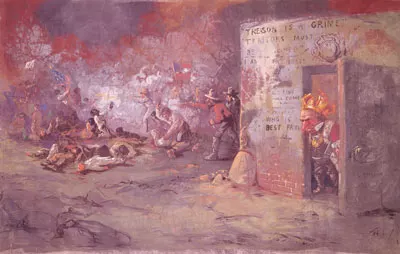
Political Cartoonist Thomas Nast drew this political cartoon, "The Massacre at New Orleans," criticizing President Andrew Johnson for his role in permitting the violence to unfold in New Orleans on July 30, 166
The Confederate military and government collapsed in the Spring and Summer of 1865, effectively ending the Civil War with the United States preserved and slavery destroyed. But the violence was far from over. White resistance to Black citizenship during Reconstruction often turned violent – as it did in New Orleans on July 30, 1866. During the war, President Abraham Lincoln had hoped that Louisiana, with a strong US military presence in Louisiana would serve as the model for readmitting states back to the United States. In 1864, the state ratified a new constitution that abolished slavery, but did not grant Black Louisianans the right to vote – something that President Lincoln began to consider as the war ended the next year.
In his last speech, delivered on April 11, 1865, Lincoln openly expressed his desire to enfranchise select freed people and emphasized that “…voters in the heretofore slave-state of Louisiana have sworn allegiance to the Union… held elections, organized a State government, adopted a free-state constitution, giving the benefit of public schools equally to black and white, and empowering the Legislature to confer the elective franchise upon the colored man.
Their Legislature has already voted to ratify the constitutional (Thirteenth) amendment recently passed by Congress, abolishing slavery throughout the nation.”1 In the crowd was John Wilkes Booth. Incensed at the thought of Black citizenship and voting, Booth assassinated President Lincoln a few days later. The violence did not stop at Ford’s Theatre.
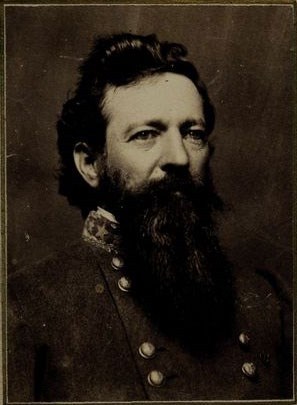
Harry T. Hays had served as a General in the Confederate Army. But in the Summer of 1866, he was the Sheriff of New Orleans, and deputized a posse of ex-Confederates to confront a citizen's convention in the city.
Gilder Lehrman Institute
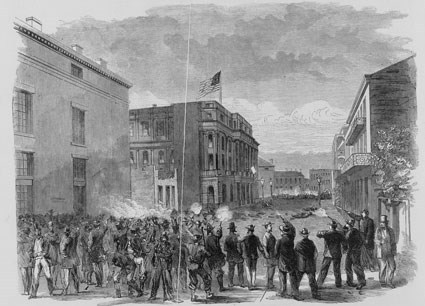
This image from Harpers Weekly depicts Confederate veterans opening fire on the crowd in New Orleans. The placement of the US flag in the drawing served as a reminder to readers that some former Confederates had not yet accepted the outcome of the war.
Library of Congress
In a matter of approximately two hours, 34 African American supporters were killed, while the wounded numbered 119. Three of the delegates who had assembled in the Mechanics Institute were killed, while 17 were wounded, and approximately 200 others arrested. When the streets around the Mechanics Institute fell quiet, General Baird ordered martial law, which remained in effect into early August. On August 1, the Cleveland Daily Leader published sentiments that were shared by many other papers across the North: “Remember that this work was done by the constituted authorities of the city of New Orleans, rebels in record and in heart, but placed in power over loyal men by the policy of a renegade President. Remember that these scenes are but a prelude of what is to be… if Mr. Johnson’s policy shall be carried out.”5 Paired with news of the tragedy that occurred in Memphis months before, the New Orleans massacre contributed to major changes in Reconstruction policy. The 1866 elections saw to it that a Radical Republican majority ruled in both the House of Representatives and Senate, and ultimately contributed to the passing of the 14th and 15th Amendments. It could even be said that the violence which transpired on July 30, 1866, in a twist of irony, gave rise to several policies that would be enacted in following years, including Federal military presence in the South, temporary disenfranchisement of former Confederates, and for a population of more than four million freed people - the right to vote. 1 Lincoln, Abraham, and Scott Yenor. “Document 5: Last Public Address.” Reconstruction: Core Documents, Ashbrook Center, Ashland University, 2018, pp. 13–17. 2 O'Donovan, Susan, and Beverly Bond. “‘A History They Can Use’: The Memphis Massacre and Reconstruction's Public History Terrain.” The Journal of the Civil War Era, 10 Jan. 2018, www.journalofthecivilwarera.org/2016/08/history-can-use-memphis-massacre-reconstructions-public-history-terrain/. 3Reynolds, Donald E. “The New Orleans Riot of 1866, Reconsidered.” Louisiana History: The Journal of the Louisiana Historical Association, vol. 5, no. 1, 1964, pp. 5–27. JSTOR, www.jstor.org/stable/4230742. Accessed 30 July 2020. 4 The New-Orleans Riot. Its Official History. New York Tribune, 1866. 5 The Louisiana Convention. Cleveland Daily Leader, 1 August, 1866, p. 1. by Park Ranger Rich Condon, Reconstruction Era National Historical Park
#“An Absolute Massacre” – The New Orleans Slaughter of July 30#1866#Reconstruction Era National Historical Park#New Orleans Massacre#louisiana#Black Voting Rights#confederates#civil war.#white supremacy#Black Freedmen
7 notes
·
View notes